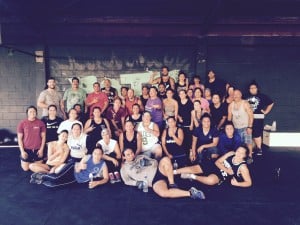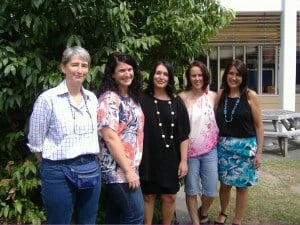 PATU© is a health and fitness programme developed by and for Māori. When Levi Armstrong graduated with a Bachelor of Sport and Recreation from EIT, he recognised the need for Māori specific-interventions to help improve physical activity levels and health outcomes for Ngāti Kahungunu. In response he created PATU© , a group exercise initiative that targets physical inactivity and sedentary behaviours associated with obesity by combining a high intensity fitness regime and healthy lifestyle education with te reo me ōna tikanga Māori.
PATU© is a health and fitness programme developed by and for Māori. When Levi Armstrong graduated with a Bachelor of Sport and Recreation from EIT, he recognised the need for Māori specific-interventions to help improve physical activity levels and health outcomes for Ngāti Kahungunu. In response he created PATU© , a group exercise initiative that targets physical inactivity and sedentary behaviours associated with obesity by combining a high intensity fitness regime and healthy lifestyle education with te reo me ōna tikanga Māori.
Alongside this initiative an EIT research team, comprising Dr Sue Chapman, Associate Professor Rachel Forrest, Jennifer Roberts, Ariana Stockdale-Frost and Lee-Anne Taylor, were funded by a Health Research Council Māori Health Development grant to develop culturally appropriate ways to evaluate PATU© from a Māori perspective. This acknowledges a holistic approach to well-being, recognising that tinana (body/physical), hinengaro (mind/psychological), wairua (spirituality) and whānau (family/kinship) are critical elements of any Māori health intervention.
The aim of the research team was to capture qualitative data from those involved with the PATU© programme, to find out what PATU© participants considered to be the important elements to evaluate and how they thought an evaluation best be done. The research targeted two cohorts of PATU© participants, one of mixed ethnicities attending a gym in Hastings and another, primarily Māori, at a Hastings workplace where PATU© sessions are run within work time at the employer’s expense.
The results from the study confirm that the most compelling feature of PATU© is whanaungatanga, the relationships that develop through shared experiences, working together, building a collective sense of belonging, and strengthen connectedness. They highlight how the PATU© initiative aligns with and promotes  traditional Māori values such as rangatiratanga (self-responsibility for health and wellbeing), whanaungatanga (community involvement and cultural awareness), kotahitanga (working together, teamwork), kaitiakitanga (respect for property and resources) and manaakitanga (caring and sharing in a reciprocal fashion) by incorporating Atuatanga into each training session and embedding te reo me ōna tikanga Māori within the programme.
traditional Māori values such as rangatiratanga (self-responsibility for health and wellbeing), whanaungatanga (community involvement and cultural awareness), kotahitanga (working together, teamwork), kaitiakitanga (respect for property and resources) and manaakitanga (caring and sharing in a reciprocal fashion) by incorporating Atuatanga into each training session and embedding te reo me ōna tikanga Māori within the programme.
A recommendation for the development of research tools to evaluate PATU© was to move to culturally-centred methods using non-individual approaches and metaphorical image-based research tools. The next phase of the research, funded by the Hawke’s Bay Medical Research Foundation, utilises a new means of evaluation using a ‘meke meter’ that is culturally appropriate whilst also drawing on quantitative, Eurocentric physical measurement tools. This is being applied to the nine-week PATU© programmes offered in 2015.
